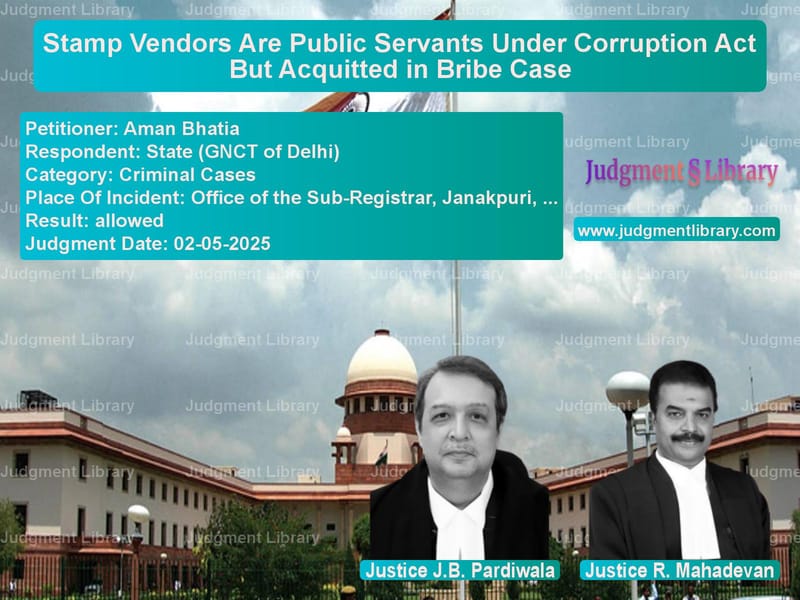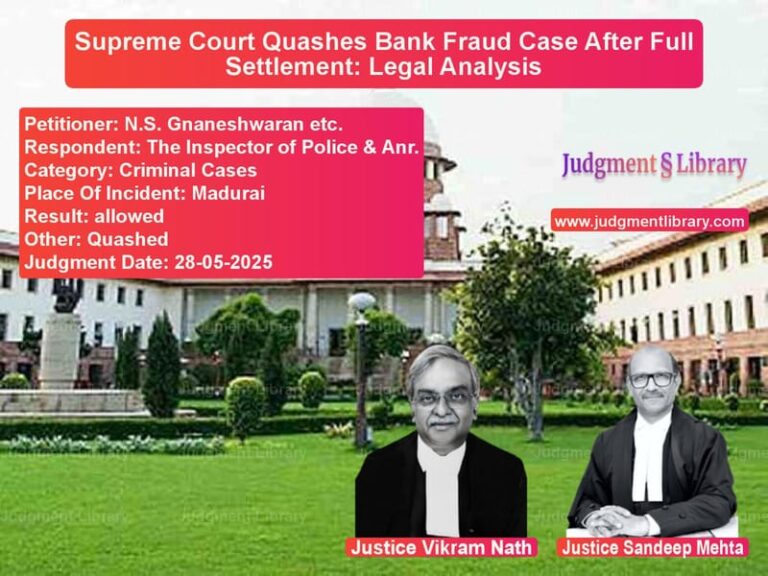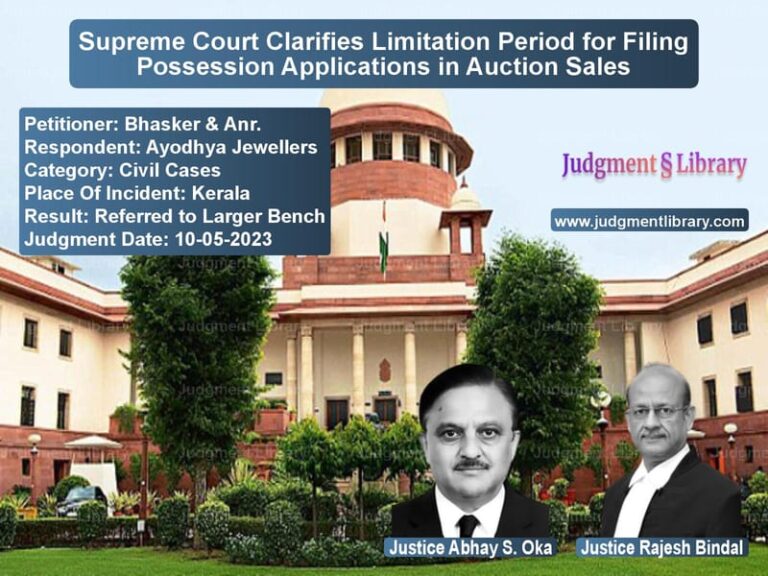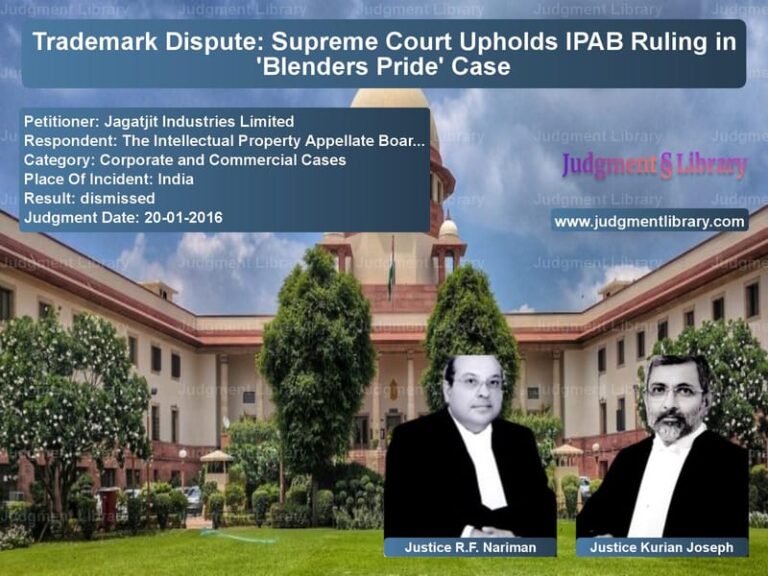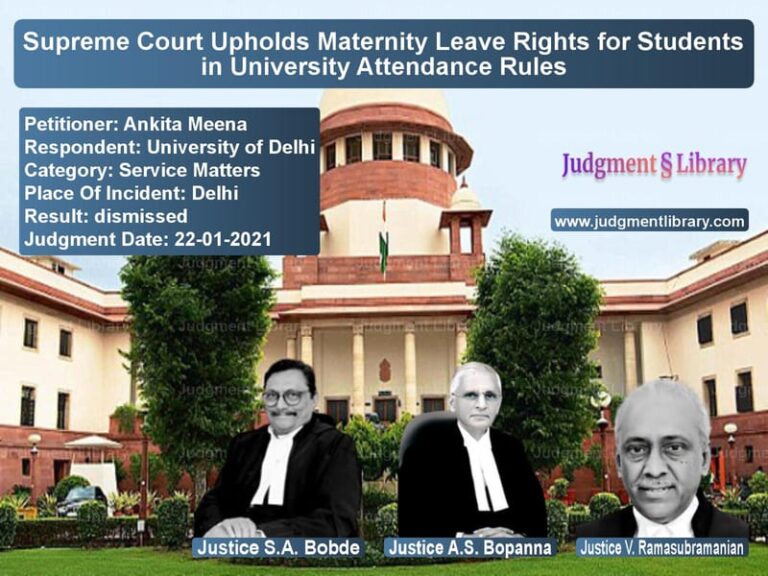Stamp Vendors Are Public Servants Under Corruption Act But Acquitted in Bribe Case
In a landmark judgment that clarifies the legal status of stamp vendors while emphasizing the importance of evidence in corruption cases, the Supreme Court recently delivered a verdict that has significant implications for anti-corruption law in India. The case involved Aman Bhatia, a licensed stamp vendor who was convicted for demanding an extra two rupees for a ten-rupee stamp paper, but whose acquittal by the Supreme Court highlights the delicate balance between legal interpretation and evidentiary standards.
The story begins on December 9, 2003, when a complainant visited the Office of the Sub-Registrar in Janakpuri, Delhi to purchase a stamp paper worth ten rupees. According to the prosecution, Aman Bhatia, the licensed stamp vendor, demanded twelve rupees instead of the face value of ten rupees. The complainant, unhappy with this extra demand of two rupees, lodged a written complaint with the Anti-Corruption Branch (ACB). What followed was a typical corruption trap operation – the ACB prepared two currency notes (one ten-rupee note and one two-rupee note) smeared with phenolphthalein powder, and the complainant, along with the raiding team, returned to the stamp vendor’s office.
When the complainant again asked for a ten-rupee stamp paper, the vendor allegedly repeated his demand for twelve rupees. The complainant handed over the treated currency notes, which the vendor accepted with his right hand. At a pre-arranged signal from the panch witness, the raiding team moved in and apprehended the vendor. The chemical test conducted on the vendor’s hand turned positive, and the currency notes were recovered from a register on his table. Based on this evidence, the vendor was charged under Sections 7 and 13(1)(d) read with Section 13(2) of the Prevention of Corruption Act, 1988.
The Trial Court convicted Aman Bhatia and sentenced him to rigorous imprisonment for six months under Section 7 and one year under Section 13(1)(d) of the PC Act. The Delhi High Court upheld this conviction, leading to the appeal before the Supreme Court. The case presented two fundamental questions: whether a licensed stamp vendor qualifies as a ‘public servant’ under the Prevention of Corruption Act, and whether the prosecution had successfully proved the charges against the appellant.
The Legal Arguments
Before the Supreme Court, Senior Counsel Mr. S. K. Rungta, representing the appellant Aman Bhatia, made several crucial arguments. He contended that the prosecution under the Prevention of Corruption Act was not maintainable at all, arguing that “at best the prosecution could have been under the Indian Stamp Act, 1899 alongwith the 1934 Rules, as these comprehensively regulate the sale of stamp papers by licensed vendors and constitute a complete code for offences related to stamps.”
Mr. Rungta fundamentally challenged the characterization of stamp vendors as public servants, stating that “a bare perusal of Section 2(c) of the PC Act reveals that a ‘public servant’ has a co-relation with the service or office under the Central Government, State Government or the local authority. He argued that the definition is exhaustive and a licensed stamp vendor does not fall in any of the clauses. Therefore, the appellant cannot be said to be in service or in office of the Central or State Government.”
On the factual aspects, Mr. Rungta highlighted serious inconsistencies in the prosecution’s case. He pointed out that “the panch witness failed to support the case of prosecution of demand of Rs. 12/- thereby rendering the arrest memo, search and seizure memo also doubtful.” He further noted discrepancies in timing, stating that “the Investigating Officer admitted that the time of arrest of the appellant was 7:15 PM, however, the raid was conducted around 3:45 PM.”
Mr. Rungta also emphasized the minimal amount involved and the appellant’s young age as mitigating factors, noting that “the appellant was only 19 years of age at the time of the commission of the offence.”
On the other side, Additional Solicitor General Ms. Aishwarya Bhati, representing the State, defended the conviction. She argued that “the High Court has rightly taken the view that the licensed stamp vendor is a public servant for the purposes of the PC Act.” She emphasized that “the 1934 Rules, more particularly Rule 34 therein makes it abundantly clear that what is paid to the vendors by the Government is remuneration in the form of discount.”
Ms. Bhati contended for a broad interpretation of the term ‘remunerated,’ arguing that “the term ‘remunerated’ occurring in Section 2(c)(i) of the PC Act should be given a meaningful interpretation so as not to frustrate the object of the PC Act. She further argued that a stamp vendor cannot get away with his liability under the PC Act by arguing that what is paid by the Government is in the form of a discount and not remuneration.”
The Supreme Court’s Analysis on Legal Status
The Supreme Court bench comprising Justices J.B. Pardiwala and R. Mahadevan conducted a comprehensive analysis of both legal and factual aspects. On the crucial question of whether stamp vendors are public servants, the court examined the legislative history and intent behind the Prevention of Corruption Act.
The court noted that “the PC Act which repeals and replaces the 1947 Act provides for a very wide definition of the term ‘public servant’ in clause (c) of Section 2.” The judges emphasized the purposive interpretation needed for anti-corruption legislation, stating that “when the legislature has used such a comprehensive definition of ‘public servant’ to achieve the purpose of punishing and curbing growing corruption in government and semi-government departments, it would be appropriate not to limit the contents of the definition clause by a construction which would be against the spirit of the statute. The definition of ‘public servant’, therefore, deserves a wide and purposive construction.”
The court extensively analyzed Section 2(c)(i) of the PC Act, which defines a public servant as “any person in the service or pay of the Government or remunerated by the Government by fees or commission for the performance of any public duty.” The judges examined whether stamp vendors fit this definition, particularly focusing on whether they are “remunerated by the Government” and whether they perform a “public duty.”
Regarding remuneration, the court examined the Delhi Province Stamp Rules, 1934, particularly Rule 28(xx) which states that “the remuneration to the vendor shall be in the form of discount allowed from time to time under the orders of the local Government” and Rule 34 which provides for commission allowed on court-fee stamps. The court explained the economic reality of this arrangement: “In terms of the 1934 Rules, when a licensed vendor procures stamps from the treasury at a discounted rate which is lower than their face value, and subsequently sells them to purchasers at their face value, the difference between the two amounts constitutes the vendor’s remuneration.”
The court provided a concrete example: “For instance, if a stamp vendor purchases a stamp with a face value of Rs. 100/- at a one percent discount, he pays Rs. 99/-. In return, he sells it to the purchaser for Rs. 100/-, i.e., the face value of the stamp. Thus, the one percent discount by the orders of the local Government effectively becomes the vendor’s remuneration, representing the margin between the procurement cost and the sale price.”
On the question of public duty, the court emphasized that “it is the nature of duty which is the determining factor in deciding whether a person qualifies to be a public servant and not the manner of appointment or mode of remuneration.” The court found that ensuring access to stamp papers, which are essential for legal transactions and revenue collection, constitutes a significant public duty.
The court made a significant observation about the interpretation of anti-corruption laws: “The definition of ‘public servant’ under Section 2(c)(i) can be said to have three parts, as they are disjunctive: first, a person who is in the service of the Government; secondly, a person who is in the pay of the Government; thirdly, a person who is remunerated by fees or commission for the performance of any public duty. The expression ‘remunerated’ in the third part has to be read in context and in line with the expressions in the first and the second part i.e., ‘in the service’ and ‘in the pay’. The three key expressions, ‘in the service’, ‘in the pay’ and ‘remunerated’ by the Government belong to the same genus and have the same flavour.”
The court concluded on this legal issue with a definitive ruling: “Stamp vendors across the country, by virtue of performing an important public duty and receiving remuneration from the Government for the discharge of such duty, are undoubtedly public servants within the ambit of Section 2(c)(i) of the PC Act.”
Evidentiary Analysis and Acquittal
Despite establishing that stamp vendors are public servants under the Prevention of Corruption Act, the Supreme Court proceeded to examine the evidence in the specific case and found it lacking. The court emphasized that “mere recovery of tainted money, by itself, is insufficient to establish the charges against an accused under the PC Act. To sustain a conviction under Sections 7 and 13(1)(d) of the Act respectively, it must be proved beyond reasonable doubt that the public servant voluntarily accepted the money, knowing it to be a bribe.”
The court noted serious inconsistencies in the prosecution’s evidence. The panch witness, who was supposed to corroborate the demand and acceptance of bribe, failed to support the prosecution’s version completely. The court observed that “the panch witness admitted that he was in a close proximity to the complainant and the appellant at the time of transaction. The panch witness further deposed that there was no other person on the counter of the appellant and thus the possibility of any exchange of communication between the complainant and the appellant being not heard properly by the panch witness is also negligible.”
Despite this ideal position to overhear the conversation, “on being questioned about a demand of Rs. 12/- being made by the appellant, the panch witness lacked recollection on whether he had informed the Raid Officer about any demand for Rs. 12/- instead of Rs. 10/-.” The Raid Officer also admitted that “he did not hear the conversation regarding the demand and acceptance of Rs. 2/-.”
The court found the delay in procedures suspicious, noting that “according to the complainant and the Raid Officer, they arrived at the Office of the Sub-Registrar at around 3:45 PM, and the Raid Officer received the pre-arranged signal from the panch witness at approximately 4:00 PM. The seizure memo of the currency notes shows the time of seizure as 4:15 PM. However, the IO stated that he was called to the scene by the Raid Officer only at 7:15 PM.”
The court also highlighted a crucial evidentiary problem: “only two currency notes were recovered, both of which had been smeared with phenolphthalein powder. Notably, even accepting the prosecution’s case for the sake of argument, the appellant was lawfully entitled to receive Rs. 10/- for the stamp paper, irrespective of any demand for bribe. Since, the Rs. 10/- note itself was tainted it becomes difficult to determine whether the change in the colour of the solution was triggered by the handling of the Rs. 10/- note or the Rs. 2/- note. Hence, the mere turning of the solution pink cannot, by itself, establish the acceptance of illegal gratification.”
The Supreme Court referenced its recent five-judge bench decision in Neeraj Dutta v. State (Government of NCT of Delhi), which had categorically held that “an offer by bribe-giver and the demand by the public servant have to be proved by the prosecution as a fact in issue for conviction under Sections 7 and 13(1)(d)(i) and (ii) of the PC Act. Mere acceptance of illegal gratification without proof of offer by bribe-giver and demand by the public servant would not make an offence under Sections 7 and 13(1)(d)(i) and (ii) of the PC Act.”
Applying these principles, the court concluded that “the prosecution has failed in establishing the allegation of demand for illegal gratification and acceptance thereof beyond reasonable doubt. Therefore, the conviction of the appellant for the offences under Section 7 and 13(1)(d) read with Section 13(2) of the PC Act cannot be sustained and is, thus, liable to be set aside.”
Conclusion and Implications
This judgment represents a significant development in anti-corruption jurisprudence. While acquitting Aman Bhatia due to insufficient evidence, the Supreme Court established an important legal principle that stamp vendors across India are public servants under the Prevention of Corruption Act. This means they can be prosecuted under the PC Act for corruption offenses, but simultaneously, the prosecution must meet the same high standards of proof required in all corruption cases.
The judgment reinforces that mere recovery of money is not sufficient for conviction – the prosecution must prove both demand and acceptance of illegal gratification beyond reasonable doubt. The court’s meticulous examination of evidence, despite the small amount involved, demonstrates the judiciary’s commitment to ensuring that convictions are based on solid evidence rather than procedural presumptions.
For the thousands of stamp vendors across India, this judgment clarifies their legal status while emphasizing their responsibility to maintain integrity in their operations. For anti-corruption enforcement, it strengthens the legal framework while reinforcing the evidentiary standards that protect against wrongful convictions. The case exemplifies how courts must balance the need to combat corruption with the fundamental principle that guilt must be proved through reliable and credible evidence.
Petitioner Name: Aman Bhatia.Respondent Name: State (GNCT of Delhi).Judgment By: Justice J.B. Pardiwala, Justice R. Mahadevan.Place Of Incident: Office of the Sub-Registrar, Janakpuri, Delhi.Judgment Date: 02-05-2025.Result: allowed.
Don’t miss out on the full details! Download the complete judgment in PDF format below and gain valuable insights instantly!
Download Judgment: aman-bhatia-vs-state-(gnct-of-delhi-supreme-court-of-india-judgment-dated-02-05-2025.pdf
Directly Download Judgment: Directly download this Judgment
See all petitions in Fraud and Forgery
See all petitions in Bail and Anticipatory Bail
See all petitions in Extortion and Blackmail
See all petitions in Theft and Robbery Cases
See all petitions in Money Laundering Cases
See all petitions in Judgment by J.B. Pardiwala
See all petitions in Judgment by R. Mahadevan
See all petitions in allowed
See all petitions in supreme court of India judgments May 2025
See all petitions in 2025 judgments
See all posts in Criminal Cases Category
See all allowed petitions in Criminal Cases Category
See all Dismissed petitions in Criminal Cases Category
See all partially allowed petitions in Criminal Cases Category

